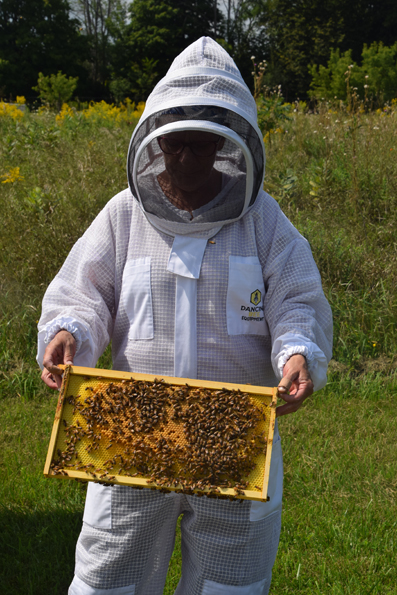Adam Prudhomme
Editor
From the outside Tamworth may seem like a quiet village, far removed from the fast-paced world of city live.
Smack in the middle of the village however is a literal hive of activity, with millions of workers bustling and buzzing to meet their deadlines. To the untrained eye however, it would be easy to drive by without even noticing.
Such is life at The Bee Spot, a family-run bee farm that not only specializes in producing honey products, but also offers tours to give the public an up close look at a very unique industry, successfully blending agri-tourism with a working bee farm.
Found throughout 32 acres of flowered fields are 80 hives, each one with thousands of bees buzzing in and out, retrieving pollen from the nearby plants.

A bee collects pollen from a nearby flower at The Bee Spot. Photo by Adam Prudhomme.
For Nadine Rochette, who operates the farm with her two adult sons, operating a honey farm marked a drastic shift from her previous lifestyle in the corporate world. After learning of the ins-and-outs of raising bees from a co-worker, she quickly became fascinated and wanted to learn everything she could. What started as a hobby has quickly grown into a second career.
“Now we are eight years as beekeepers,” said Rochette. “It didn’t take us long to fall in love with the whole genetics of honey bees and started working on stabilizing genetics.”
Recently she invited the Beaver to take a tour of her farm, located at 695 Addington St. That included donning a bee suit and opening up a hive to get a look at a queen, a necessary part of the job as she keeps a close tab on all the colonies.

Nadine Rochette performs a routine inspection on one of her hives. Photo by Adam Prudhomme.
“We thought we got into bees for honey, but now we’re into bees for genetics and hopefully helping to elevate the lines that are in Ontario and available to local beekeepers,” said Rochette.
Part of that includes breeding queens that display a range of traits, not only related to honey and egg production, but in temperament as well. Drawing on her corporate experience, she keeps a spreadsheet during her routine inspections, marking everything to how tolerant the bees are of her when opening the hive to the number of egg being produced.
“Our goal is gentle bees that manage their pest level that are productive,” she said. “At the end of the day we want to have some honey to sell. Productive not just in honey production but in baby production, brood production.”
She says she likes to give back to the bee keeping community, part of that being through educational tours.

An inside look at one of the hives. Photo by Adam Prudhomme.
“We run tours here on Fridays and Saturdays morning, we’ll bring people in and go through basically the bee live cycle, their roles and their responsibilities within the hive as they mature within the hive,” she said. “Then we suit up, light a smoker and perform a real inspection with all the surprises they bring us. We always make a plan before going into the yard and I would say 99.9 per cent you start and you have to acknowledge that the plan is not what you’re going to be working on that day. This needs to be addressed. So we acknowledge and adjust and then work with the bees.”
Much like any farm, their day-to-day is very unpredictable and completely reliant on their livestock. The only difference being instead of 1,400 pound cattle, their livestock is millions of tiny insects.
Each year their business continues to expand, now selling supplies for fellow beekeepers, as well as offering courses for those interested in getting started.
“”I think one of the things I’m trying to demystify is the effect whether you’re vegan or meatatarian, you’re dependent on bees,” said Rochette. “If meat is your food, it eats grass or some kind of crop. If you’re vegan or vegetarian, all of your food is dependent on pollinators.”
She hopes that bit of education will encourage people to show more compassion for the buzzing insects as they play a critical role in every ecosystem.
“Our goal, the way that our business has evolved, is really focused on education to the beekeeping community, supporting the beekeeping community,” she said.
The Bee Spot will continue to offer tours through the end of September, before pausing for the winter. They’ll resume again next May.
For more about everything they offer, visit https://www.thebeespot.ca/.

